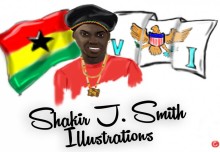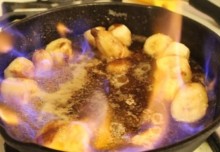Tiphanie Yanique Interview by Tami Navarro
Tiphanie Yanique is the author of the short story collection, How to Escape from a Leper Colony, published by Graywolf Press in 2010, the picture book I Am the Virgin Islands, published by Little Bell Caribbean in 2012) and the novel Land of Love and Drowning, published by Riverhead/Penguin. Land of Love and Drowning was awarded the 2014 Flaherty-Dunnan First Novel Prize. BookPage listed her as one of the 14 Women to watch out for in 2014. Her writing has won the 2011 BOCAS Prize for Caribbean Fiction, Boston Review Prize in Fiction, a Rona Jaffe Foundation Writers Award, a Pushcart Prize, and an Academy of American Poet’s Prize. She has been listed by the Boston Globe as one of the sixteen cultural figures to watch out for and by the National Book Foundation as one of the 5 Under 35. Her writing has been published in Best African American Fiction, The Wall Street Journal, American Short Fiction and other places. Yanique is also the recipient of a Fulbright scholarship.
Tami Navarro is a cultural anthropologist born and raised on St. Croix. Her writing has appeared in the journals Global South, Cultural Anthropology, and The Caribbean Writer. She is the Associate Director of the Barnard Center for Research on Women and the Editor-at-Large of the journal Scholar and Feminist Online.
1. Can you talk a bit about your connection(s) to the Virgin Islands? How do your experiences of the islands influence your writing?
I was born on the island of St. Thomas and raised in the Hospital Ground/Round da Field neighborhood. My maternal family can trace its roots in the Virgin Islands to back at least five generations…maybe more. The story is that we go back to the Caribs—I love that story! But I can’t verify it. As a fiction writer, however, I believe that the narrative is more important than the documented truth. The narrative we make for ourselves is how we live—it becomes us, then that us creates history with that belief in mind. The truth is relative, anyway. This story of myself, of how I came to be a Virgin Islander, has had a profound impact on my writing. I write for the Virgin Islands, about the Virgin Islands and from the Virgin Islands.
2. Your first novel, Love of Land and Drowning, has recently been released. It revolves around a family and its history, but is also a book about the Virgin Islands and our history. What led you to write about the territory?
Some smart person once said that a writer only has one story that she tells over and over again in different ways. If this is true then my life’s story, the one all my work has been about and will be about, is belonging. The issue of belonging is also a major political one in the Virgin Islands. One might argue that a fraught relationship to belonging is the native condition of the Virgin Islander (are we Americans or West Indians? Is any individual a native Virgin Islander? A local Virgin Islander? An aboriginal Virgin Islander? A Virgin Islander at all?). But belonging is central also to my very personal narrative. My parents didn’t raise me. My biological grandparents were not married. This has caused me to often feel pulled in unusual directions when looking for who I belong to. I know I belong to my maternal grandmother and my grandfather (technically, my step-grandfather), who raised me. But do I also belong to the Galibers (my mother’s father’s family) to the Smiths (my mother’s mother’s family) to the Girauds (my father’s family), to the Harrigans (my step-grandfather’s family)? To all of them? To none?
In this way, I hope my own very private and personal struggles with belonging help poise me to be a useful voice in talking about the issues of belonging to the Virgin Islands at large.
3. Can you talk a bit about your other previously published work?
My children’s book is a called I Am the Virgin Islands. My husband, who is a Floridian by birth but a great lover of the VI, and I both considered it a VI book. In this book I make reference to historical, culinary, literary, political, environmental and other elements of Virgin Islands identity. I really hope that schoolteachers in the VI might use the text as a way to help students learn more and appreciate more about the place where they live. I had no intention of marketing I am the Virgin Islands outside the VI. Since then, however, readers in the States have embraced it as a book making a claim for an international identity. A book about being who you are because of the place you choose to love…and how children are more able to forge identities out of their love of a place than adults. Adults seem more interested in knowing what is not themselves, whereas children are still collecting selves.
My first full-length book is a collection of short stories called, How to Escape from a Leper Colony. I love writing short stories—their brevity forces a writer to be very particular. The cool paradox, however, is that a short story collection can be much more varied than a novel. Each story can go in a completely different direction (a different place, a different form, different characters, etc.) than the next. In the story collection I really try to do something different with each story. My characters are from various races, ethinitcies, religions, age groups, time periods and economic backgrounds. It is a very pan-Caribbean collection in that it explores characters from all over the region…even Caribbean people in the States. The epigraph for the collection is from a Catholic prayer to the saint of travelers and lovers: “Lead me to those I am waiting for, those who are waiting for me.” Which is to say that this collection is also about belonging!
4. You’re a professor at the New School in New York. Do you focus on Caribbean texts in your courses? How do you integrate these into your classroom?
I always teach Caribbean texts in my courses. No matter what the course is called. This is, obviously, a political decision. While I do teach Caribbean literature courses, I also want students and colleagues to understand that books by Caribbean writers might also add valuable notes to conversations about all literary issues. Caribbean literature has something vital to add to conversations in Post-Colonial literature, feminist literature, literature of the environment and most definitely creative writing craft classes.
5.Now that your debut novel has been published, what is your next project?
My next work will be poems. The collection is called “Wife,” and will be published by Peepal Tree Press…a publishing house in England lauded for publishing important Caribbean poets. Like my other work, this is also about belonging. In this case, it’s about belonging to the unit we call a marriage. It will be out this coming Fall 2015. It’s my first collection of poetry. Please wish me luck!



